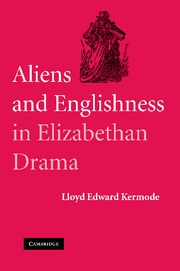Book contents
- Frontmatter
- Contents
- Preface
- Acknowledgements
- 1 Introduction – aliens and the English in London
- 2 Discovering the alien in Elizabethan moral drama
- 3 Accommodating the alien in mid-Elizabethan London plays
- 4 Incorporating the alien in Shakespeare's second tetralogy
- 5 Being the alien in late-Elizabethan London plays
- Postscript: Early modern and post-modern alien excursions
- Notes
- Bibliography
- Index
5 - Being the alien in late-Elizabethan London plays
Published online by Cambridge University Press: 28 June 2009
- Frontmatter
- Contents
- Preface
- Acknowledgements
- 1 Introduction – aliens and the English in London
- 2 Discovering the alien in Elizabethan moral drama
- 3 Accommodating the alien in mid-Elizabethan London plays
- 4 Incorporating the alien in Shakespeare's second tetralogy
- 5 Being the alien in late-Elizabethan London plays
- Postscript: Early modern and post-modern alien excursions
- Notes
- Bibliography
- Index
Summary
Jean Howard has noted that ‘city comedy is an interesting successor to the history plays’ of the 1590s, for it shifts the focus of national identity-building from its concentration on the monarch to a negotiation between communal imperatives. In her study of Westward Ho, Howard promotes the new genre's concentration on the subject's ‘relationship to certain places, values, customs, and institutions that could … lead to new understandings of what constitutes Englishness’. Such ‘new understandings’ would be in part characters – in addition to a monarch or everyman/everywoman figure – finding a certain individuality, autonomy, or independence from older communal ideas of identity, even as urban community and unity are simultaneously trumpeted. The first play I look at in this chapter, William Haughton's Englishmen for My Money (1598), does indeed follow the shift away from the monarch and into the valorization of English subjects in urban spaces. Thomas Dekker's The Shoemaker's Holiday (1599), which I discuss later, however, uses and adjusts elements from the earlier genres to show that the new ‘city comedy’ does not entail a clean break from the dramatic past. It enacts a surprising return to the history genre's central iconic delineation of the monarch as the touchstone of Englishness; in doing so it also reminds us of an urban history play like Sir Thomas More, in which city matters are in the last instance determined by the will of the king.
- Type
- Chapter
- Information
- Aliens and Englishness in Elizabethan Drama , pp. 119 - 149Publisher: Cambridge University PressPrint publication year: 2009



